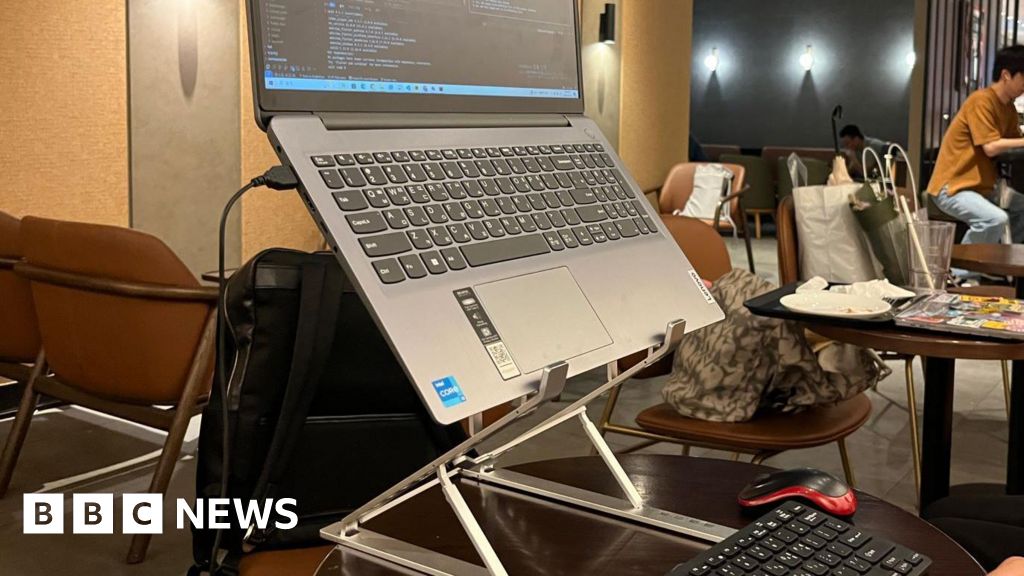生成中...【新闻趣摘】
"韩国咖啡馆遭遇'钉子户'!"首尔大峙洞的咖啡店主玄成柱最近很头疼——有位客人带着两台笔记本和六孔插线板,在店里"安营扎寨"一整天。这可不是个例,韩国"自习族"(Cagongjok)已成文化现象,他们霸占咖啡馆的架势让英国人都自愧不如。最夸张的是,有人甚至搬来台式显示器、打印机,还有人用书本"圈地"占座。星巴克韩国最近忍无可忍,出台新规要整治这些"极端案例",但强调不会赶人只会"温柔劝导"。18岁休学备考的柳同学坦言:"我每天从早11点待到晚10点,有时把东西放这就去吃饭。"网友调侃:"这哪是咖啡馆,分明是'自习室PLUS'!"不过也有店主表示理解,毕竟70%的韩国Z世代每周至少去咖啡馆学习一次。全州某咖啡馆老板金先生则直接划出"禁学区",规定学习最多两小时。看来这场"咖啡馆功能保卫战"还得打下去~
---
**South Korea's cafe culture clashes with"desk hogging" students**
韩国咖啡文化与"霸桌"学生发生冲突
**Starbucks Korea issued nationwide guidelines to curb extreme cases of customers transforming cafes into personal offices with monitors and printers.**
星巴克韩国发布全国性 guidelines,遏制顾客将咖啡馆改造成带有显示器和打印机的个人办公室的极端案例。
**The move follows complaints of"Cagongjok" (cafe studiers) monopolizing seats for 12+ hours with multiple devices, leaving no space for social drinkers.**
此举源于对"自习族"用多个设备垄断座位12小时以上、不给社交顾客留空间的投诉。
**"We're not banning but guiding toward considerate behavior," Starbucks told BBC, noting theft risks from unattended belongings.**
"我们不是禁止而是引导 considerate 行为,"星巴克告诉BBC,指出无人看管物品的盗窃风险。
**Cultural phenomenon**
文化现象
**70% of Gen Z jobseekers study weekly in cafes per survey, fueling 48% surge in coffee shops since 2018 to nearly 100,000 nationwide.**
调查显示70%的Z世代求职者每周在咖啡馆学习,推动全国咖啡馆数量自2018年以来激增48%,达到近10万家。
**Students cite cafe ambiance as preferable to libraries -"less pressure, better coffee" says 18-year-old exam candidate Yoo.**
学生称咖啡馆氛围优于图书馆——"压力更小,咖啡更好",18岁考生柳同学说。
**Franchises initially encouraged the trend with power outlets and study-friendly layouts before overcrowding became an issue.**
连锁店最初通过电源插座和适合学习的布局 encourage 这一趋势,直到过度拥挤成为问题。
**Business impacts**
商业影响
**Daechi cafe owner Hyun blocks outlets after customer plugged in six devices:"High rents demand seat turnover."**
大峙洞咖啡馆老板玄在顾客插入六台设备后 blocking 插座:"高租金要求座位周转。"
**Jeonju's Kim Cafe imposed 2-hour study limit after"two people occupied ten-seat space for entire day".**
全州金氏咖啡馆在"两人占用十人座位一整天"后 imposing 两小时学习限制。
**Independent shops face dilemma - alienating studiers risks losing 30% of weekday revenue.**
独立店铺面临 dilemma——疏远自习族可能损失30%的平日收入。
**Policy responses**
政策回应
**Starbucks' soft approach contrasts with indie cafes' strict time limits, reflecting lack of consensus on solutions.**
星巴克的 soft 方法与独立咖啡馆的严格时间限制 contrast,反映 solutions 缺乏共识。
**New guidelines prohibit"desk partitioning" and unattended belongings but avoid outright bans.**
新 guidelines 禁止"分区占桌"和无人看管物品,但避免 outright 禁令。
**"Signs alone don't work - we politely explain space-sharing ethics," says Seoul barista Park Ji-min.**
"仅靠 signs 没用——我们会礼貌解释空间共享道德,"首尔咖啡师朴志敏说。
**Student perspectives**
学生观点
**University aspirant Mo Yu-jin defends cafe studying:"Libraries feel like pressure cookers with surveillance cameras."**
大学考生牟裕珍 defend 咖啡馆学习:"图书馆像有监控摄像头的高压锅。"
**Part-time worker Lee Hae-chan spends ₩15,000 daily on drinks to"rent" cafe workspace 8 hours.**
兼职工作者李海灿每天花费1.5万韩元购买饮料来"租用"咖啡馆工作空间8小时。
**"We're not freeloaders - I buy 3 drinks per study session," insists high school senior Kim Do-yoon.**
"我们不是 freeloaders——每次学习我会买3杯饮料,"高中生金道允 insists。
**Economic factors**
经济因素
**Tiny apartments (avg 27㎡ in Seoul) make cafes attractive workspaces for young Koreans.**
狭小公寓(首尔平均27㎡)使咖啡馆对韩国年轻人成为有吸引力的工作空间。
**₩6,000 ($4.50) americano buys 4 hours of heated/air-conditioned space with free wifi and toilets.**
6000韩元(4.5美元)的美式咖啡可购买4小时带暖气/空调、免费wifi和厕所的空间。
**"It's cheaper than coworking spaces," explains freelance designer Jeong Seo-yeon.**
"这比联合办公空间 cheaper,"自由设计师郑瑞妍 explains。
**What next?**
下一步
**Starbucks may trial"study hours" (10am-3pm weekdays) if guidelines prove ineffective.**
如果 guidelines 无效,星巴克可能试行"学习时段"(工作日早10点至下午3点)。
**App-based seat sharing platforms gaining traction to optimize cafe space utilization.**
基于应用程序的座位共享平台 gaining 关注,以优化咖啡馆空间利用。
**As Korea's cafe boom collides with work-from-anywhere culture, businesses must innovate to accommodate both studiers and socializers.**
随着韩国咖啡馆繁荣与随处工作文化 collide,企业必须 innovate 以适应学习者和社交者。
**The Cagongjok phenomenon underscores deeper societal issues - from cramped housing to workplace pressures - that won't be solved by outlet covers or time limits.**
自习族 phenomenon underscore 更深层的社会问题——从拥挤住房到职场压力——这不是插座盖或时间限制能 solve 的。
**Perhaps the ultimate solution lies not in restricting cafe use, but in reimagining how urban spaces can better serve both productivity and community needs.**
也许 ultimate 解决方案不在于限制咖啡馆使用,而在于重新构想城市空间如何更好地 serve 生产力和社区需求。

